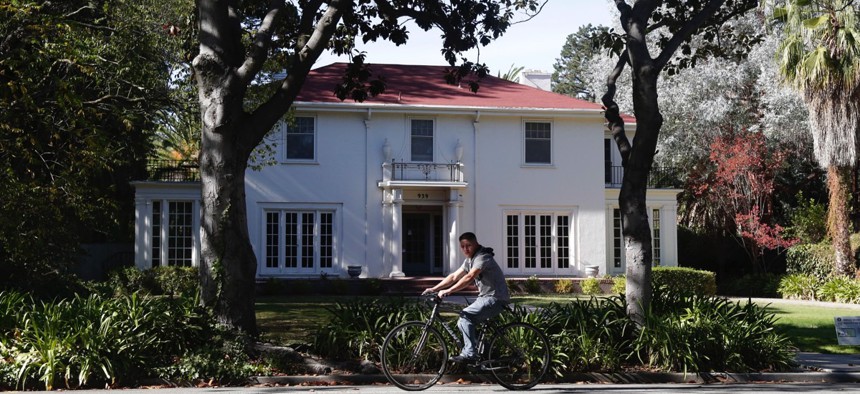Planning Commissioner Priced Out of Palo Alto

A man cycles past a large home in Palo Alto, California. Marcio Jose Sanchez / AP Photo

Connecting state and local government leaders
“I cannot see a way to stay in Palo Alto and raise a family here,” wrote Kate Downing in an open letter.
Decrying the high housing costs in Palo Alto, California and knocking the local City Council for inaction on the issue, a planning and transportation commissioner in the affluent Silicon Valley enclave posted a letter online this week, saying she was quitting her post and leaving town.
“After many years of trying to make it work in Palo Alto, my husband and I cannot see a way to stay in Palo Alto and raise a family here,” wrote Kate Downing. She and her family have plans to pull up stakes and relocate to Santa Cruz, which is about a one-hour drive south.
Downing explained that she and her husband rent their current home with another couple for $6,200 per month. Buying it, she estimated, would cost about $2.7 million with a $12,177 monthly payment, after taking into account the mortgage, taxes and insurance.
“This is unaffordable even for an attorney and a software engineer,” she added in the letter.
The median home value for all homes in Palo Alto during June of this year was about $2.5 million, according to figures maintained by the real estate data firm Zillow. Statewide in California, the company’s data show that the median value was about $466,000.

Located about 35 miles southeast of San Francisco, Palo Alto has around 66,000 residents and is in Silicon Valley, an epicenter for California’s booming technology sector.
The median household income there between 2010 and 2014 was estimated to be roughly $126,000, U.S. Census Bureau data show.
Downing said she repeatedly recommended to the Council ways to help improve the supply of affordable housing in Palo Alto.
Among her suggestions: allow two floors of housing instead of one in mixed-use developments, legalize duplexes and enforce minimum density requirements.
The City Council in Palo Alto, she wrote, had ignored pleas from residents to make affordable housing a top priority and had instead “charted a course for the next 15 years of this city’s development which substantially continues the same job-housing imbalance.”
“I struggle to think what Palo Alto will become and what it will represent when young families have no hope of ever putting down roots here,” Downing wrote.
“And meanwhile,” she added, “the community is engulfed with middle-aged jet-setting executives and investors who are hardly the sort to be personally volunteering for neighborhood block parties, earthquake preparedness responsibilities, or neighborhood watch.”
Bill Lucia is a Reporter at Government Executive's Route Fifty and is based in Washington D.C.

NEXT STORY: Are Animal Hoarders Criminals?





